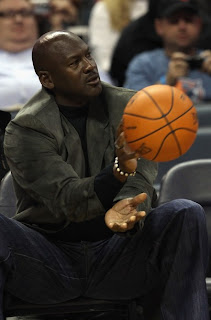
This time, he can escape his personal stress, if only for a moment, when he stunningly resigned from the franchise, ran from the burdens and surrendered in his successful coaching career to finally realize he's not capable for such a tiring and stressful task.
It is, I dare say, telling that Larry Brown, upset and disgruntled with his team for weeks, wasn't the suitor to mend the dysfunctional Bobcats.
And for a while there, the Charlotte Bobcats were a burgeoning unit on the rise, turning into a watchful event for spectators in a popular atmosphere of passionate and loyal fans that traditionally cheers for famous college athletic programs.
It was a spectacular season for the Bobcats a year ago, an NBA team that posted the best record in franchise history, had the league's top defense and advanced to its first ever postseason appearance.
It wasn't long ago when Brown, wearing a dirty gaze on his face, was unhappy with the cost-cutting trade that sent center Tyson Chandler to Dallas for Erick Dampier, who was eventually cut by Charlotte.
It would figure, given the parallels of a divorce for all the misgivings and bungles poorly made by executives, that Brown was mentally burned out with the perpetual maneuvers.
This doesn't seem as shocking as it is to visualize the abrupt departure of Brown, a coach admired heavily with his win-now approach, if nothing else, which seemed to arouse Michael Jordan in hiring the sophisticated teacher of basketball.
For once, working for a stubborn-minded Jordan wasn't so easy and Brown left for what seems to be the end of his longstanding career. He packed his bags and took his belongings, ready to breathe and leave behind a tedious profession.
For now, presumably, he doesn't have to report for work, but can take a hiatus, or better yet, retire forever and embrace life outside of basketball. It's going to take a makeover and the hiring of a clever coach to rebuild the Bobcats, but until then, surrounded by scumbags within a mismanaged business, the Bobcats are delayed of rising as ultimately a dominant force.
As for Jordan, owner of the Charlotte Bobcats, he has foolishly dismantled his own franchise with his ill-advised draft mistakes as a perplexed NBA executive—see 2008 when he carelessly passed on Stanford's Brook Lopez.
If he was unwilling to select a beastly 7-footer, listening to Brown rant in the draft room that he had preferred to select D.J. Augustin, it's obvious Jordan had accommodated his coach and grabbed the point guard over the muscular 7-footer.
And although he was discontent with Raymond Felton, Brown didn't want to see the star guard leave as a free-agent unless he was replaced by a full-time starter.
The demise of the Bobcats is cast upon a sharp-minded Hall of Famer, in terms of playing for a team, but not running it as a business.
Sadly enough, the Bobcats are on the brink of inferiority and uncertainty, blinded by Jordan's lapses. They could have clearly risen in the Eastern Conference if he made wiser decisions, instead of his boneheaded choices of late.
But as in the case of Brown, he demanded much of the personnel decisions as the coach and, as it turns out, he had been in a feud with Jordan.
In the wake of the firing, along with the sudden surprise in the last day, it's an indisputable theory of which he was extremely tired of the belligerence. If Jordan had been in communication or reached an understanding with Brown, instead of losing his patience for a lousy relapse, he would have been able to reconcile.
But he couldn't repair a relationship in shambles, not after Brown vigorously formed his own roster and constantly was unsure whether he desired to remain on the job or escape from the endless headaches. Not after Jordan invested his own money to refurbish the Bobcats.
If there ever were a moment that Jordan desired to have the last word, as always, it showed when he dismissed Brown on Wednesday and deeply occupied himself with the stiff assignment of accepting the everyday responsibilities.

Ever since Jordan purchased the majority share of the Bobcats, taking control of basketball operations, he vastly improved the roster by gambling and neglecting long-term deals.
We have seen precisely in his tenure, as Jordan traded Jason Richardson and Jared Dudley for Boris Diaw or traded Stephen Jackson and his grueling contract, that he initially tried to upgrade.
But it all backfired in his face, although the risky deals had an immediate impact and bolstered Charlotte into the postseason.
It is amazing how fast the Bobcats plunged, and for now, Jordan is assigning the coaching duties to Paul Silas, an old-school coach and well-known custodian of Charlotte.
So then, maybe he's the suitable voice, given his history of a strong method in coaching and urgent style.
All of the sudden, a financial crisis dooms the Bobcats, and the $99.2 million paid to Gerald Wallace, Jackson, Diaw and Thomas over the next three seasons dents a rebuilding plan as the Bobcats are above their means as far as finances.
And the result, after he spent from his own pocket by taking on enormous salaries for underachievers, is that he's reportedly considering a trade proposal. That would send Augustin, DeSagana Diop and Matt Carroll to the Los Angeles Clippers for Baron Davis. If so, he'd reunite with his former Hornets coach Silas.
Sure, it seems a little weird that Jordan vowed to expose his franchise to the market, vowed to be available and vowed to sell the organization, especially after giving Brown control.
Meanwhile, Jordan tried to assemble the Bobcats, but instead ruptured his legacy. Consider this a mental lapse for a man, now in control of his depleted franchise. Consider this a disaster.
No comments:
Post a Comment